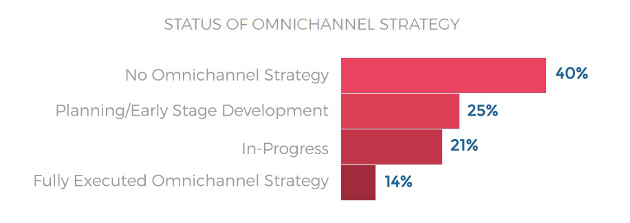Is your marketing team executing a successful omnichannel strategy for the holidays?
If you haven't been able to unify a strategy across all your marketing channels just yet, you're not alone: 86% of e-commerce marketers have not executed a full omnichannel marketing strategy for their brand this holiday season, according to the 2017 E-commerce Holiday Report.
That's shocking, since so many e-commerce leaders are constantly talking about the importance of coordinating marketing across channels to engage buyers. It seems everyone is talking about it, but no one is really doing it.
Why is it so tough for marketers to execute a true omnichannel strategy effectively?
We dug into the data to learn why so many B2C marketers are struggling with omnichannel this holiday season.
By the Numbers
For the 2017 E-commerce Holiday Report, hundreds of e-commerce leaders shared their marketing plans for the 2017 holiday season, covering a wide range of topics and tactics. One of the most interesting findings of the report is that most teams are woefully unprepared to market across channels in time for the holidays this year.
In fact, when asked about the status of their omnichannel strategy, here's how marketers responded:

Fully 40% of marketers said they have no omnichannel strategy at all, while 46% said they are working on it. And a mere 14% of B2C marketers said they have a full omnichannel strategy in place for their brand.
Though omnichannel may be a trendy topic in e-commerce, it hasn't penetrated the day-to-day operations of most B2C marketers just yet, this study clearly shows.
What's Behind This Trend?
Why, exactly, are B2C marketers struggling to coordinate campaigns across multiple channels and devices?
The answer is complicated.
For some marketers, omnichannel is just not a priority when they're working hard to grow an e-commerce business from nothing. And some B2C marketers simply don't have enough time to think long-term and put together a thoughtful strategy for omnichannel.
For many other marketers, the real root of the problem is a struggle to access customer data. Omnichannel is next to impossible if you don't understand exactly how your buyers interact with your brand across every single channel.
But understanding how they interact is especially tough because buyers have access to so many channels, including the following:
- Your company website
- Email marketing
- Online targeted ads
- Mobile apps
To market to your customers effectively, you need to correctly identify them as they move across channels. To share the right message to drive a new purchase, you need to know that the same person is opening your emails, clicking on your Facebook ads, and browsing your website.
That's why the need for accurate customer data is at the core of the struggle for all omnichannel marketing.
Strategic Omnichannel Marketing
By getting a better handle on your customer data, you'll be able to more easily create an omnichannel strategy. With the knowledge that your best customers tend to browse your product on their mobile phone and later open an email, for example, you can build a strategy to take advantage of that exact behavior.
But without understanding the data on your customers' behavior first, you'll continue to struggle to build an effective strategy.
Executing an effective e-commerce omnichannel strategy is a challenge, but it's not impossible. Your brand can become one of the select few to successfully execute a targeted and thoughtful omnichannel marketing program for your buyers.
And since other B2C marketers aren't capable of approaching omnichannel just yet, it's a huge opportunity for your brand to stand out from the crowd.
Want to learn more about trends in B2C marketing this holiday season? Download the full 2017 E-commerce Holiday Report now.




